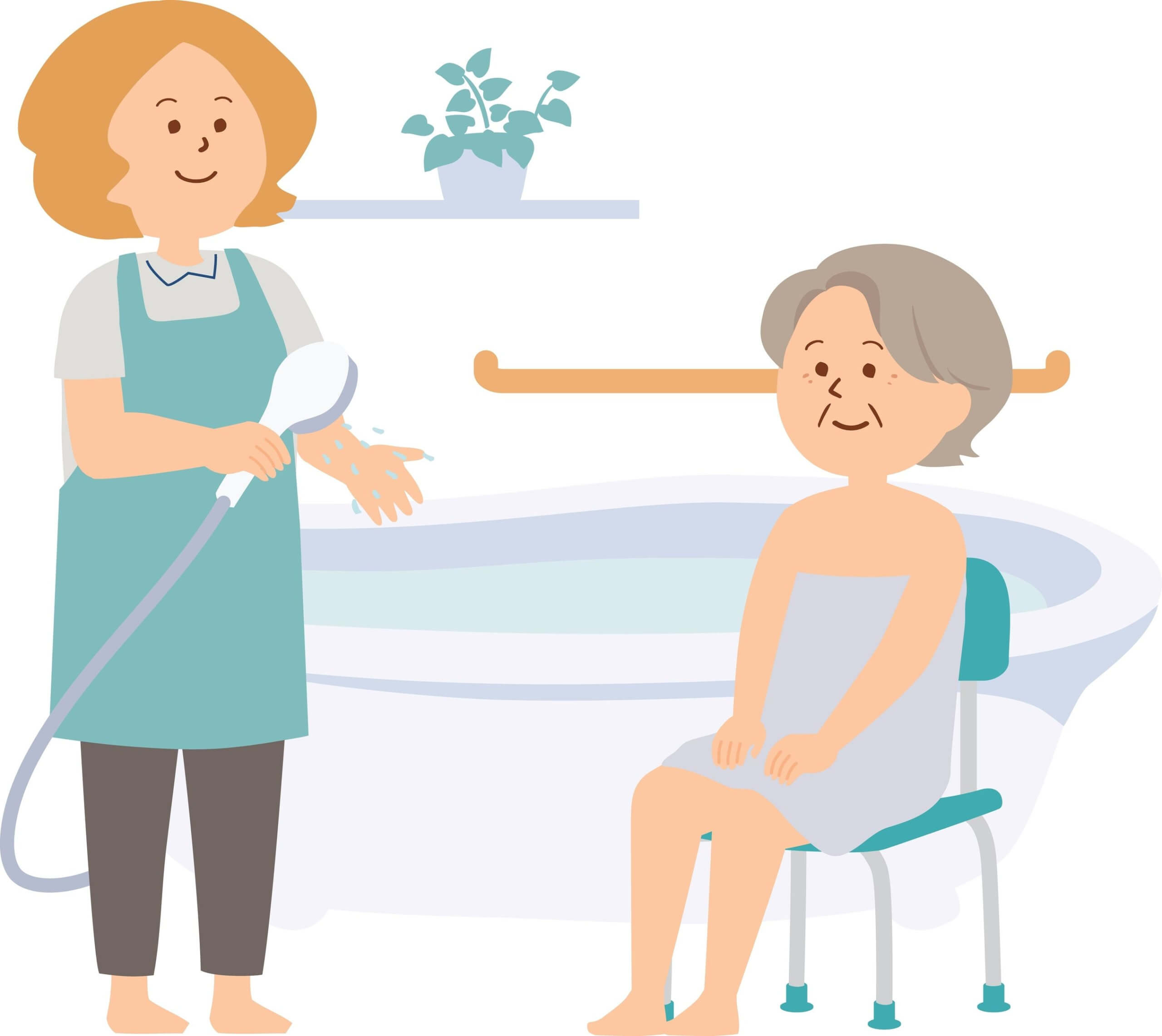
I know, it is usually more than two things, but, these two, in particular, seem to ramp up the need for 24/7 in-home care or transitioning to an assisted living facility. Toileting and Bathing. Some helpers/caregivers can help a spouse or partner with toileting and bathing duties with no problem, but when it comes to an aging parent, they can’t seem to handle those areas. Some are willing to learn how to do these things safely and some are not going to do them at all. Still, others will do it in an emergency situation, but not all the time. Whatever you choose is the right decision for you.
August 31, 2022
Emotions, feelings, physical strength, and preparedness are all important factors in helping someone to toilet or bathe. Embarrassment, Stress, Rebellion, Stubbornness, Shame, and whatever else shows up will have to be dealt with respectfully. Everybody will feel embarrassed.
Helping Your Loved One with Privacy and Personal Hygiene
We all want to do our private business by ourselves. Imagine, that you have had surgery on your right shoulder and your left arm is hooked up to an IV bag on a pole. Now, imagine that you have to go to the bathroom badly and it is not to pee. Can you wait on a nurse? No. A side note, it is so much easier to let someone, you don’t know, who is trained in helping a patient poop and then clean their bottom, help you than it is to let a partner, spouse, or loved one help you. I was so embarrassed to have someone that I knew and loved to wipe my bottom. It was an awful feeling. The person doing the wiping was great and it did not seem to bother her as she said, “I’ve cleaned my kids’ butts, no big deal.”
Pooping is a normal bodily function. Peeing is a normal bodily function. Why did I wig out over having to go? Because I could not take care of my needs at the time. I was vulnerable. I was embarrassed. I needed help. I am the one that helps others, I don’t need help. Although, I am not sure that I could wipe someone’s bottom that I love or care about on a regular basis. I probably could in an emergency, but not all the time. I guess we really don’t know what we will or won’t do until we are put in the situation. I have learned to never say never. Some of you are thinking, “Well, if you did it once, then you can do it again and again.” Probably, but I don’t want to!
You better be strong and patient
It takes time, effort, and physical strength to help a loved one toilet and bathe. It takes someone that knows how to do these things appropriately and safely. It takes someone that is patient and kind throughout the entire process. Will both of you get over the embarrassment? If you can, then all the better to help your loved one be as independent as possible. Realizing that some help with toileting and bathing will help your loved one stay at home longer.
Safety needs for older folks and memory care folks
Grab bars are a must for the toilet and shower/bath. A raised toilet seat will help too. Non-slip decals need to be placed in the tub. Brighter light is a plus. Some bathrooms need to be heated with a ceramic floor heater or an oil-filled radiator heater. Be sure whatever you get, is appropriate and safe for a bathroom.
Schedule regular bathroom breaks every 2 – 4 hours. Give them time to get there. Pack your patience and a loving demeanor along with a loving tone. Give them directions and let them know what you are doing.
-
- The toilet seat is right behind you. Squat down slowly to sit.
-
- I am going to help you stand up now. Scoot your butt forward.
-
- Lean forward and put your hands on my forearms when you are ready. Then ask them to raise/stand up. (Do not pull on their arms or legs. Hold on to the trunk of their body or their hips.)
Learn to wipe properly
If it is the opposite gender from you, learn to wipe properly. For example, an adult son, helping his mom toilet needs to know that to wipe a female, you wipe from the front to the back. So, put on your gloves and wipe from the vagina towards the rectum. This keeps fecal matter from getting into the vaginal opening and the urinary tract. Use wet wipes for cleaning and throw them in the trash can. Keep the private areas clean to lessen the chance of a UTI.
If the person you are helping has a dementia, remember that they can sense emotions so keep calm and carry on. Do not make a big deal out of anything. Do not mention clothes or the mess. Sing a song and carry on. They are going to have an accident.
Nighttime Accidents:
Either they cannot make it to the toilet on time or they have no awareness that they need to “go,” The unawareness may be due to a dementia. It may also be that they have no warning from their brain signals that they have to “go.” They do not feel the urge. Sometimes, they feel the urge too late and can’t make it on time. Shit happens, literally. Use the adult undergarments. Don’t call them diapers. Absorbent underwear with pads under the bottom sheet in the pelvic area may help protect the mattress. If urinary or bowel incontinence is an issue at night, go ahead and place two bottom sheets on the bed with pads in the appropriate place. Keep the mattress dry. That way, you can strip off the top layer, get them cleaned up, and back into bed without too much fuss.
You may also try using an absorbent menstrual pad under the absorbent underwear to catch excess urine.
If they have a poop incident at night, you may have to strip them, get them in the shower, and wash them. Place some Vicks Vapo Rub under your nose to block some of the smell. Lotion them and redress them. If they are calm, then back to bed, and if not, go to the kitchen for a little snack or treat. Rinse the poopy clothes in the toilet to get as much fecal material off as you can. The same goes for the sheets and blankets. Launder in the washing machine. Sing a song and soldier on. The calmer you are the calmer they will be. If they do not have a dementia, the calmer you are the less stressed they will be. It is okay, it was an accident.
Do’s and Don’ts
Learn their habits. When do they normally poop? After breakfast? After the second cup of coffee? After dinner? When do they usually pee? Another useful tidbit … wear easy-on and easy-off clothes. Help them to maintain their privacy and dignity as much as possible. Dignity is based on people’s feelings, emotions, and perceptions & other peoples’ reactions to them. Watch your tone of voice. Do not use words of any kind that associate with a “baby-state.”
-
- Close the door when they are in the bathroom. Give them privacy (if it is safe).
-
- Cover the top of their lap with a towel.
-
- Give them extra time to sit. Bodies need to relax to pee and poop.
-
- Knock before opening a door.
-
- Turn your head away when they are pulling their pants up or down.
-
- Do not discuss their business with others.
-
- Do not restrict their fluid intake because of incontinence. You may slow it down after dinner, but never stop them from drinking. You need to encourage drinking throughout the day.
Let’s move on to showering.
Showering or bathing 3 times a week may be sufficient. You can use wet wipes for underarms, privates, feet, and rolls (where skin touches skin) on the other days. Lotion is good for their body and so is a face moisturizer. Clean clothes and underwear every day. Teeth brushed twice every day and flossed once a day.
Shower day:
-
- Gather all supplies you will need (shower chair or bench, body soap/wash, pouf with a handle, 3 washcloths, shampoo, conditioner, shaving cream/gel, razor, 3 towels, robe, body lotion, etc.) Some use a barber’s cape to cover them.
-
- Heat the bathroom with a heater.
-
- Deep breathe and get yourself in the right frame of mind to help them.
-
- Follow them in and help them toilet and undress. While they are on the toilet, start the shower and check the temperature before putting them in. A hand-held shower head is very useful. Warmer than lukewarm water, but not hot.
-
- Have them use the grab bars and guide them to the shower seat. ** Note: if you know that you will be the one washing the private parts and bottom …Latex gloves on, have 2 washcloths ready, and use one for their front and one for their backside. Rinse well and then have them sit. **
-
- You may drape a towel over their lap and shoulders to maintain dignity.
-
- Allow them to wash on their own. You only help if they can’t get everything washed.
-
- Wash the hair and condition it, first (always rinse well).
-
- Wash the body from face down. Start with the face, neck, and ears. Then proceed to the shoulders, back, right arm, and left arm. Front of body, under breasts, right leg, right foot, and toes, left leg, foot and toes, Be gentle when lifting limbs. You may have to ask them to lean forward or to the side. Have them clean their bottom and private parts, if at all possible. This is easier while they are standing. Decide what works best for them, private parts first or last.
-
- Drape a terry cloth robe around them (it helps in the drying process).
-
- Try to pat dry and not rub vigorously (again, you want them to do everything they can do).
-
- Look at the skin for any red or cracked places. If there are some, contact their primary care doctor. You may need to use a skin protectant like Calmoseptine.
-
- Lotion everywhere, except between the toes. Make sure between the toes are completely dry. Make sure the genitals, perineal area, and bottom areas are dry as well.
-
- Ask them about their normal routine for shaving. Some men shave in the shower and some shave after their shower at the sink. Ask the ladies if they want to shave, as some may no longer shave or even need to shave their legs. Ask them about shaving their underarms too.
-
- Ask them if they prefer the morning, evening, or afternoon for a bath/shower.
When you need to help them wash body parts:
-
- If you need to help them wash, use latex gloves (this barrier may make them and you feel more comfortable).
-
- Use a clean washcloth for the genitals area and another clean washcloth for the anal area
-
- For females, clean from front to back. Washing the inner thighs, labia groin and perineum.
-
- dry the skin folds and skin underneath the breast.
-
- Apply face moisturizer
-
- Apply lotion.
-
- Apply deodorant.
-
- Brush teeth.
-
- Get them dressed in clean clothes and comfortable for a little rest afterward. They will be tired. Give them their favorite drink or snack.
-
- For males, clean the tip and shaft of the penis and the scrotum & perineal area. For uncircumcised men, pull back the foreskin, wash, rinse and place the skin back into position.
-
- Wash the anal area (where the poop comes out). Use a clean area of the washcloth with every pass.
-
- Be quick, gentle, and efficient. Rinse well.
Always have clean sheets once a week after a bath. The little things do matter.
Yes, you will have a load of laundry to do after bath time. Accept it.
Pat



